Whether you are doing extended dry camping or just between campground destinations, your RV fridge needs to keep your perishables cold until you are plugged in again. Some folks think that running an RV fridge on an inverter is the answer, but is it?
If you want to conserve propane, you can indeed use an inverter to keep your fridge running when you aren’t plugged in. In addition to propane conservation, this is a great option for newer RVs that are equipped with residential refrigerators that only run on AC power.
Of all the appliances inside a standard RV, your fridge is arguably the most important to keep running. So we are going to further explore the pros and cons of running an RV fridge on an inverter.
Plus, we will help you determine your refrigerator’s specific power needs and provide some tips for choosing an inverter that will fit your lifestyle and be compatible with your recreational vehicle.
So let’s get started!
Can You Run An RV Fridge Using Inverter While Moving?
Most RV refrigerators run on propane when you aren’t plugged in. This requires very little DC electricity for the electronics and interior light, so it’s actually a great option for dry camping or boondocking.
You can, however, run an RV refrigerator on an inverter to avoid drawing too much power when you aren’t plugged in. So, it is worth it to explore this option for intervals between campgrounds or those that need to conserve propane for other purposes when camping off-grid for extended periods.
The good news is that many modern RVs are already equipped with inverters. Plus, your fridge may already have the electronics to know to switch over to power being supplied by the inverter when propane is limited.
If your RV isn’t already equipped with an inverter, however, you will need to ensure that you choose one that is compatible with your fridge, other appliances, and RV batteries.
What Is An RV Inverter?
In the simplest terms, an RV inverter converts direct current (DC) to alternating current (AC). Your RV battery stores and supplies DC electricity, but many of your appliances (some refrigerators included) require AC electricity.
In short, an inverter will allow your refrigerator (and other AC appliances) to run off the power in your RV batteries while you aren’t plugged in at an RV park.
To make this happen, the inverter will need to be hard-wired into your RV’s existing electrical system.
What Type of RV Fridge Do You Have?
Mainly, there are two types of RV refrigerators: two-way and three-way fridges. Two-way RV refrigerators can run on two types of power (usually propane or AC power). Three-way fridges can work with three types of power (AC, DC, and propane).
On top of this, there are normal RV fridges and residential-style RV refrigerators. The type that you have in your rig can impact how much wattage your inverter needs to be rated for. So let’s review some of the pros and cons of residential and standard RV refrigerators.
Residential Refrigerators
The main benefit of residential fridges is their increased capacity. They are much larger than a standard RV fridge and they also tend to be more efficient at maintaining your desired temperature. These fridges also usually run on only AC power, so there’s no propane flame to worry about.
On the flip side, these fridges usually require a pure sine wave inverter. They also require that the inverter remain on indefinitely to provide power to the fridge.
Inverters are not 100% efficient, so you will experience some power loss and you will also probably need to supplement your existing battery capacity with an additional battery and/or solar panels for more efficient recharging.
Standard RV Refrigerators
Standard RV refrigerators give you more flexibility to run them off of either liquid propane gas, DC power, or AC power. As a result, they allow you to reduce electrical consumption by switching back and forth between power sources.
That said, these refrigerators are not nearly as efficient as residential fridges, and that is especially true in extreme cold, extreme hot, and humid environments.
They also take more time to cool down once the door is opened and they don’t retain temperature as well as residential-style RV refrigerators.
How Much Power Does Your RV Fridge Need?
As you might imagine, this will depend on the size of your RV refrigerator. A 16-cubic-foot refrigerator, for example, will require an inverter that’s rated for roughly 1,500 watts of continuous power and approximately 3,000 watts of surge power.
What is the Difference Between ‘Continuous’ And ‘Surge’ Power?
Most appliances require more power on the initial startup than they use once they are running.
The wattage required to get an appliance running is typically called ‘surge watts’ or surge power. The wattage required to keep an appliance running once it is started is called continuous power or ‘running watts’.
How to Power an RV Fridge With An Inverter
If you are set on using an inverter to power your RV’s fridge, here are the simple steps you’ll need to take to add an inverter to your electrical system.
Find Your Fridge’s Power Ratings
For starters, you will need to begin by understanding the power needs for your rig’s specific refrigerator. Usually, you can find these ratings by looking at the sticker on the inside of your fridge.
If you don’t find it there, you may need to comb through your RV owner’s manual to find the surge and running wattages for your unit. Note both of these wattages down so that you can use them in your search to find a compatible inverter.
Choose An Inverter For Your RV
Next, you will need to choose an inverter that is rated to supply enough power for your refrigerator. If your fridge requires 3,000 surge watts, for example, you will need an inverter that can match that need.
But it’s also a good idea to allow for some wiggle room to make sure you don’t overload your inverter when your fridge starts up. For example, if your refrigerator is rated for 3,000 surge watts, you may want to look for an inverter that is rated for at least 3,500 watts.
There are also a couple of different types of RV inverters you will need to choose from. The three main types are pure sine wave inverters, modified sine wave inverters, and square wave inverters.
In general, most RV refrigerators that run on AC power only will require a pure sine wave inverter. Standard refrigerators can work with a modified sine wave inverter or a square wave inverter, but they are both much less efficient than a pure sine wave inverter.
Check out our article on the 10 best RV power inverters to learn more about choosing the perfect model for your RV’s energy needs.
Hard-Wire Your Inverter Into Your Electrical System
For this step, we highly recommend employing the services of a trained RV electrician. Otherwise, you might look into finding a mobile RV mechanic in your area because messing with your rig’s electrical system can be dangerous if you don’t know what you are doing.
Basically, you will be installing the inverter between your batteries and your fridge. Power coming from the battery will be connected to the inverter, which will then convert it from direct current (DC) to alternating current (AC).
From there, the inverter will be wired into your fridge to supply it with the AC power that it needs.
While it sounds simple, it can be easy to mess this up if you aren’t experienced. So, again, please look into hiring a professional (even if it’s just to assist you).
Even the best YouTube videos these days are no substitute for in-person help from a trained professional.
Test The System
Once your inverter is hard-wired into your system, you will need to turn your refrigerator on and switch it over to the AC setting (if applicable). Allow it an hour or two to cool down before re-checking to make sure it is functioning properly.
Problems With Running an RV Fridge On An Inverter
Even though it is certainly possible, there can be some issues with running the refrigerator in your RV on an inverter. Let’s cover them quickly so that you can be aware.
Battery Storage
One of the major issues with running an RV fridge on an inverter is battery storage. Most RV refrigerators require a healthy amount of power. So running them from your house battery can risk depleting it to the point where your other critical appliances will no longer function as normal.
Of course, it is possible to install an extra battery to upgrade your RV’s total power storage capacity. Many folks who are interested in boondocking or dry camping also recharge their batteries daily using solar panels to avoid discharging them too far.
Fridge Type
In some of the larger and more modern RVs, manufacturers are including residential-style refrigerators.
While these fridges certainly boast more storage space and convenience than a normal RV fridge, some of them will run on AC power only.
Of course, your inverter will convert DC-to-AC, so that’s not necessarily the problem.
But larger fridges have higher wattage ratings and, if they are running on AC 100% of the time, they are even more likely to deplete the stored power in your RV batteries if you go too long between plugging in at campgrounds.
Inverter Installation
If your RV isn’t already equipped with an inverter, you should request the services of a professional electrician with RV experience.
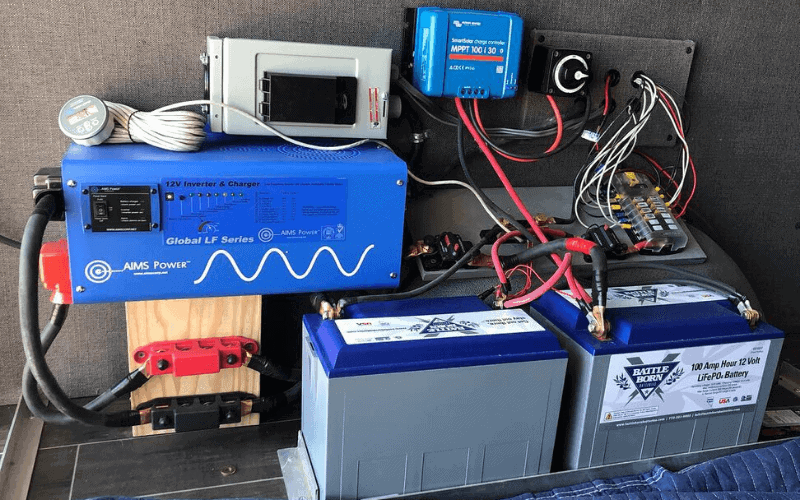
Because you will need to hard-wire a new inverter into your existing electrical system, certain important precautions must be taken.
Employing a professional will cost more money than you may be prepared to spend right now.
That said, it will help you avoid damaging your RV’s electrical system, existing appliances, or, in the worst case scenario, yourself.
Alternative to Running RV Fridge On An Inverter
If your RV isn’t equipped with an inverter and you don’t want to go through the trouble of installing one, you can also run your RV fridge by powering up your generator.
For many RVers, this is a temporary solution for supplying power to their fridge and other large appliances.
Mainly, however, it is used for an hour or two in the morning and evening. In essence, it is a way to minimize the amount of liquid propane your RV refrigerator is using if you are spending multiple days traveling or dry camping.
That said, this also leaves the question of what to do if you have a residential refrigerator that runs on AC power only.
Some folks insist that it is dangerous to run your generator while your RV is moving, which is a primary time when an AC-only fridge would need power either from an inverter or a generator.
But others say that it isn’t harmful to run a generator while your RV is in motion. From personal experience, we used to turn our generator on all the time while driving to warm up lunch or tea in the microwave.
Our rig never suffered any ill effects that we know of and the good thing about residential refrigerators is that they retain cold well.
So if you run your generator twice for 30-minute stints during a three-hour drive, for example, that very well may be enough to keep the contents cold until you get to your next campground and plug back in.
Conclusion
The great thing about most RV refrigerators is that they are designed to run on multiple power sources.
Unlike your residential fridge (which will most often be rendered completely ineffective during power outages), fridges in RVs are quite versatile.
That being said, we urge caution when meddling too much with the established electrical systems in your RV.
Unless you have plenty of experience and technical skills, you can risk creating larger issues when you are simply trying to improve the functionality of your refrigerator.
As always, we hope that you’ve found this article useful and that a few of the insights we’ve included have helped you increase your RVing Know How. We’d love to hear about your upcoming travel plans in the comments below!

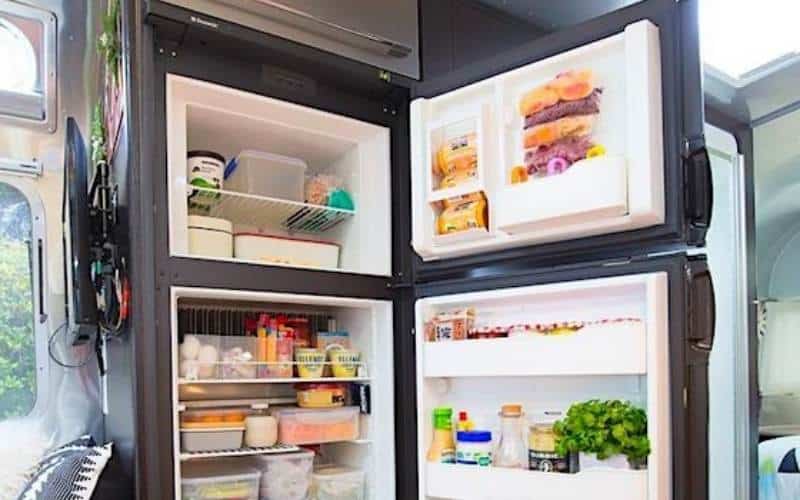


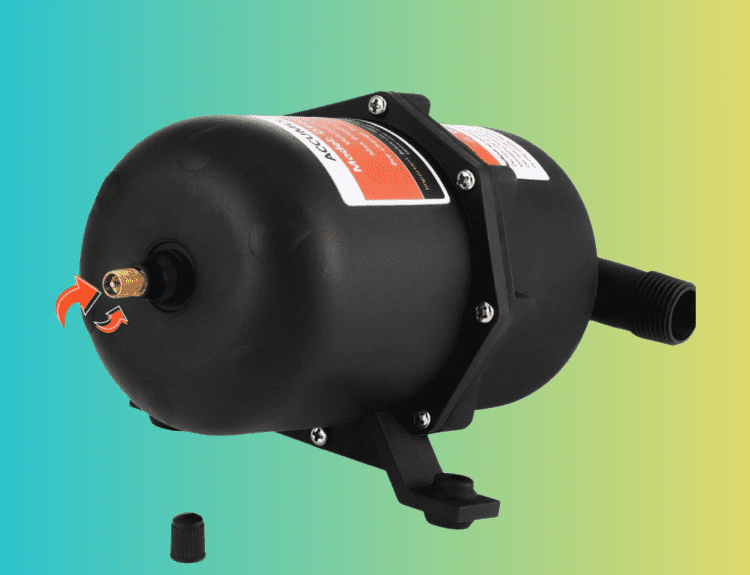
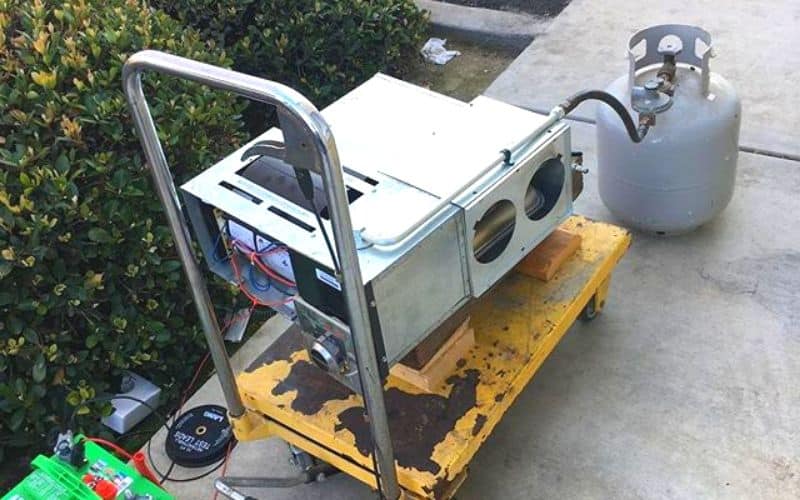
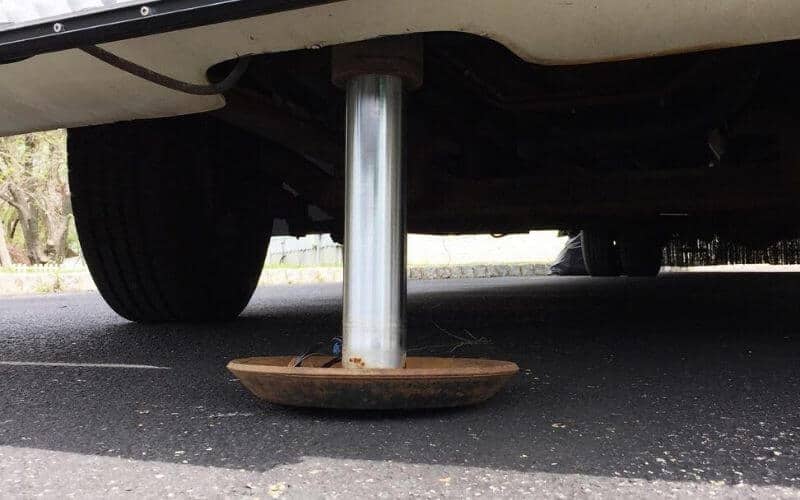
1 Comment
John Addington
3 years agoWhat RV did I see that was residential, 12V, with dedicated battery?